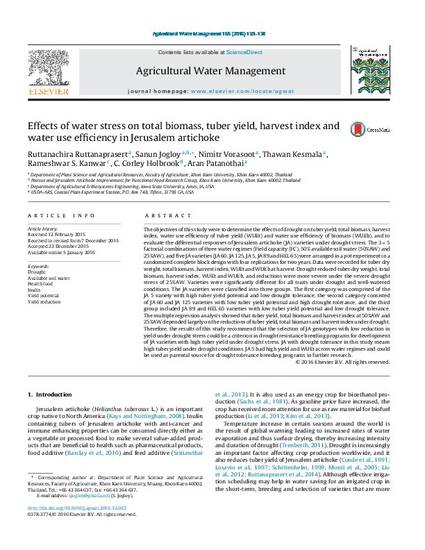
The objectives of this study were to determine the effects of drought on tuber yield, total biomass, harvest index, water use efficiency of tuber yield (WUEt) and water use efficiency of biomass (WUEb), and to evaluate the differential responses of Jerusalem artichoke (JA) varieties under drought stress. The 3 × 5 factorial combinations of three water regimes (Field capacity (FC), 50% available soil water (50%AW) and 25%AW), and five JA varieties (JA 60, JA 125, JA 5, JA 89 and HEL 65) were arranged in a pot experiment in a randomized complete block design with four replications for two years. Data were recorded for tuber dry weight, total biomass, harvest index, WUEt and WUEb at harvest. Drought reduced tuber dry weight, total biomass, harvest index, WUEt and WUEb, and reductions were more severe under the severe drought stress of 25%AW. Varieties were significantly different for all traits under drought and well-watered conditions. The JA varieties were classified into three groups. The first category was comprised of the JA 5 variety with high tuber yield potential and low drought tolerance, the second category consisted of JA 60 and JA 125 varieties with low tuber yield potential and high drought tolerance, and the third group included JA 89 and HEL 65 varieties with low tuber yield potential and low drought tolerance. The multiple regression analysis showed that tuber yield, total biomass and harvest index at 50%AW and 25%AW depended largely on the reductions of tuber yield, total biomass and harvest index under drought. Therefore, the results of this study recommend that the selection of JA genotypes with low reduction in yield under drought stress could be a criterion in drought resistance breeding programs for development of JA varieties with high tuber yield under drought stress. JA with drought tolerance in this study means high tuber yield under drought conditions. JA 5 had high yield and WUEt across water regimes and could be used as parental source for drought tolerance breeding programs in further research.
Available at: http://works.bepress.com/rskanwar/152/

This article is from Agricultural Water Management 166 (2016): 130–138. DOI: 10.1016/j.agwat.2015.12.022.